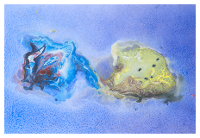Speaker
Alexandr Bylinkin
(ITEP Institute for Theoretical and Experimental Physics (RU))
Description
The transverse momentum spectra of hadrons produced in high energy collisions can be decomposed into the two components: the exponential ("thermal") and the power ("hard") ones.
Recently, the H1 Collaboration has discovered that the relative strength of these two components in Deep Inelastic Scattering depends drastically upon the global structure of the event - namely, the exponential component is absent in the diffractive events characterized by a rapidity gap. We discuss the possible origin of this effect, and speculate that it is linked to the mechanism of confinement. Specifically, we argue that the thermal component is produced in the fragmentation of the color string due to the effective event horizon introduced by confinement, in analogy to the Hawking-Unruh effect. In diffractive events, the t-channel exchange is color-singlet and there is no fragmenting string - so the thermal component is absent.
Analyzing the data on non-diffractive pp collisions, we find that the slope of the thermal component of the hadron spectrum is proportional to the saturation momentum that drives the deceleration in the color field, and thus the Hawking-Unruh temperature.
Author
Alexandr Bylinkin
(ITEP Institute for Theoretical and Experimental Physics (RU))
Co-authors
Andrei Rostovtsev
(ITEP Institute for Theoretical and Experimental Physics (RU))
Dmitri Kharzeev
(Stony Brook U./BNL)
